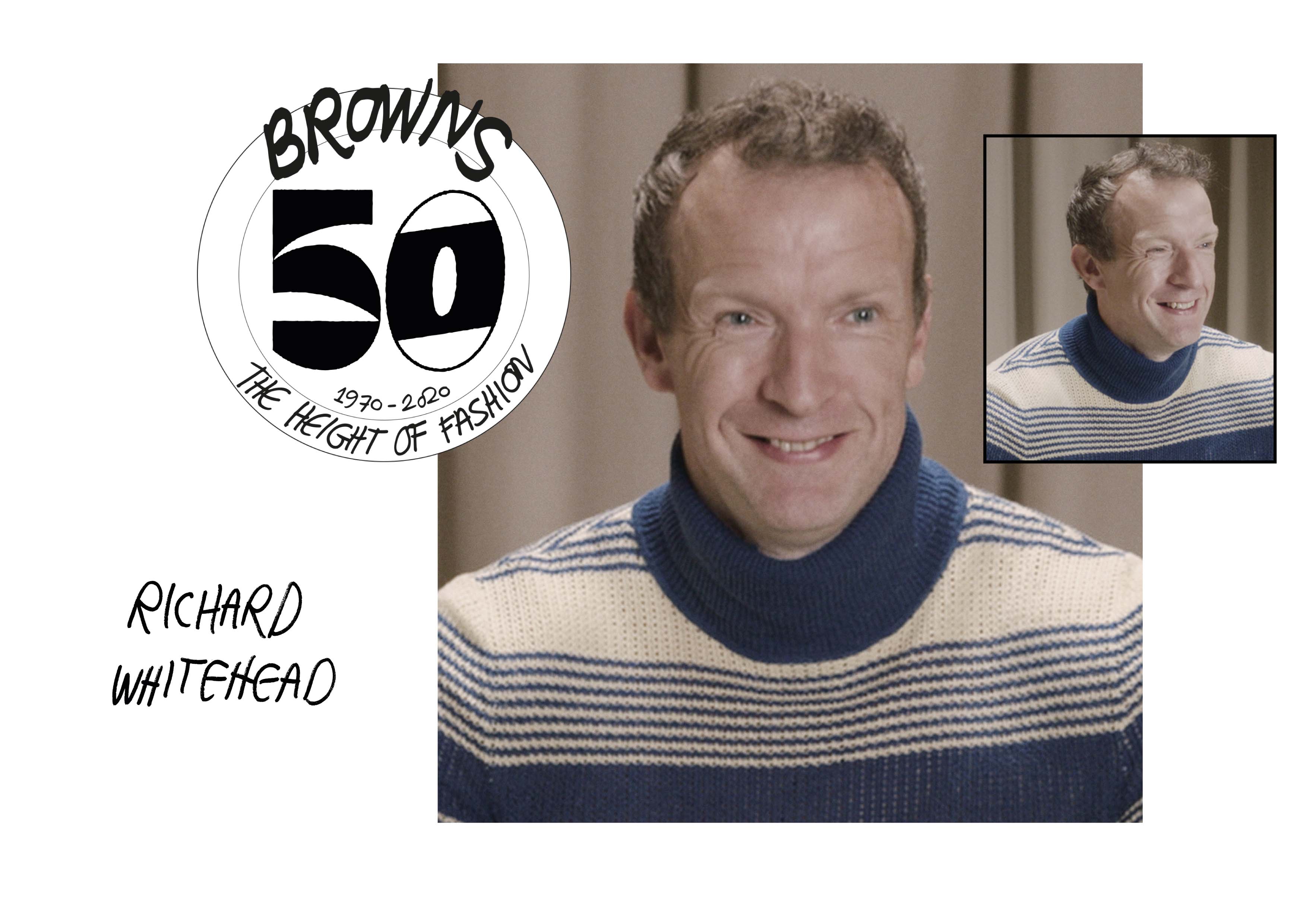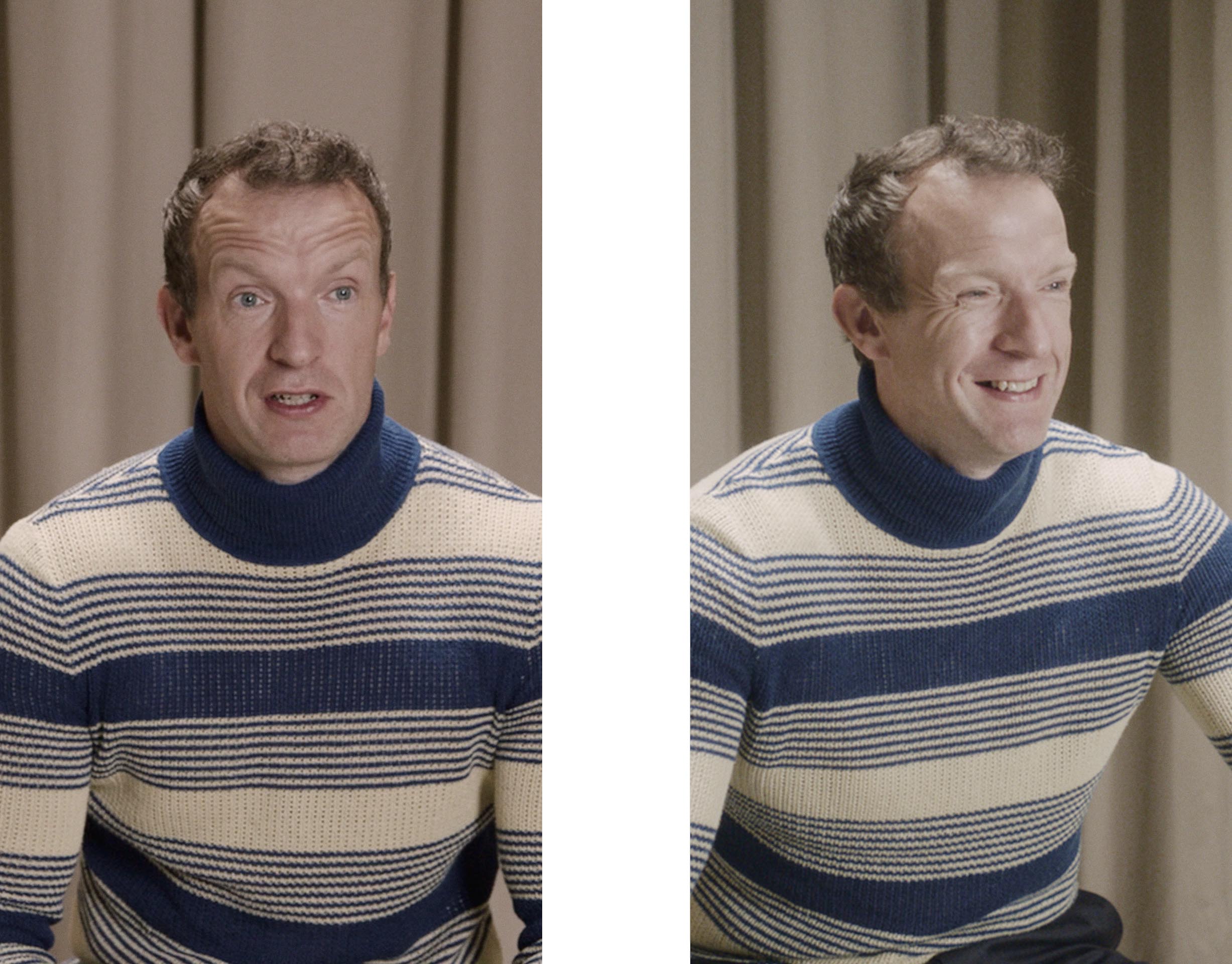Browns 50: A Conversation With Richard Whitehead

The last time Browns met Richard Whitehead, it was on the set of our Browns 50 shoot, where he brought a touch of gold medallist glitter to proceedings and recounted stories of his “Height Of Fashion” moments in our “Testimonials” fitting room.
Flash forward a couple of weeks, and we meet again via a Zoom call in his home in Nottingham, a place where he’s been spending more time this year due to the postponement of the sporting events that usually dominate his schedule. Laughing as he gestures to the dozens of Nike boxes piled up around him (he is an ambassador for both Nike and Gucci), Richard tells us a bit more about his love of style, overcoming adversity and how to deal with the daily struggles we all face.
Can you tell us a bit about your upbringing and how you got your start in sport?
I was brought up in the late Seventies, so the environment generally was different - especially being disabled. I’m from a little village called Loudon, and there weren't any disabled youngsters in that village at that time, so they had to overcome some stigmas regarding ability and disability and what a disabled person looks like. My parents always saw sport as an opportunity to integrate in society. It also offers you those boundaries that you want to overcome. A lot of the time when people said “what were your major challenges growing up?”, it was more about people’s perceptions and what is possible or not possible.
One of the amazing things about what you do is that I think people think: “Oh I couldn’t do this because I’m not sporty,” but you show that it’s about so much more than that. It’s about the stories that you tell yourself around what you can do or what people think you can do.
[Exactly], and having hope that there are possibilities out there. Also understanding that everyone in life has challenges and obstacles to overcome, and it’s about putting yourself in those uncomfortable positions sometimes. Whether you’ve had an accident, or an illness, or you were born with a disability like I was, you’ll always have those key moments in your life where you either take that step forward and accept the challenge, or unfortunately you don’t accept that challenge and then the road is quite bumpy. Fortunately, I’ve always had those people around me - whether it’s family or friends or coaches - that have encouraged me to accept those challenges.
Can you tell us a bit more about your philanthropic projects and the causes that are close to your heart?
I work with Médecins Sans Frontières. I’ve done some work in Beirut with the British ambassador around the land mines and working in challenging situations. It’s really challenging myself and my family’s expectations of what these environments are like. Also, I’m the patron of the Sarcoma UK charity. To be a small part of charities like that is amazing. Also close to my heart, I work with Limb Power.
Richard, who does your scheduling? You’re the busiest man in Britain!
It’s about always moving. The energy I put into my gym and my track, I also like to put into my charity work. I don’t see it as work or charity, I see it as an obligation. I always knew that there was a time when I’d be able to give back, and obviously 2012 and the Paralympics gave me the opportunity to do that. Everybody should do more - whether that’s helping out at a local charity shop in the village, or giving their time to support an elderly neighbour.

As someone whose life is normally so dictated by participating in competitive sport, how has it been for you with all the competitive events being postponed this year?
The idea of being very static with the work you do, it’s one of those mindset things. I take my kids to school and we do homework and those things, but then my other part of my life which is obviously sport - it doesn’t have to manifest itself in just training or competing. That’s when you have to have a little bit of a mind shift regarding what you do with that time. I went to Grantham yesterday, and opened a a school for children with learning disabilities and autism called Amber Gate. I often don’t realise that kids look up to me - kids quite like my legs as well! They say: “Oh, I like your robotic legs!” There’s some common ground there with some of the challenges and obstacles that kids have, because it’s tough to be a kid. It’s about reassuring younger people that it’s OK to be different, and embracing that.
What would be one piece of advice to both disabled and able-bodied people? A small thing that they can do in their lives to deal with a difficult time?
Resilience is key. It’s a cliché, but enjoy the journey! Things that you appreciate in life take time. As a youngster, I wanted everything to happen at 100 miles per hour. But then you don’t really have time to sit back and evaluate what you’ve done. My mum and dad keep these scrapbooks of all the things I did when I was younger, and I was like: “Why’ve you kept all that?” But now it’s quite nice to look back and see all the things I’ve done in the past.
Do you do the same for your children?
Yeah I do! I have a memory box and things like that.
What effect has having children had on you?
Sometimes you have those bumps in the road that then send you off in a different direction, and I think children support that in that they present a different challenge every day.
Alongside your charity work, you’re also a spokesperson for Gucci and Nike. Did you always have an interest in clothes and fashion?
My mates who I grew up with were quite trendy, so you have to keep up with the Joneses a little bit! I’ve always liked suits and shoes - I’ve got hundreds of pairs of shoes! [Richard laughs and gestures to the dozens of Nike boxes that we can see in the background].
When you work with brands, how do you bring the other parts of your work into that role?
With certain brands, when you’ve got that relationship, you can really embrace it. You get to know the inner workings of the brand. It’s not just about the clothes, it’s about the core values. With equality and diversity being a really important agenda at the moment, it’s nice to be in that conversation when brands and designers are thinking about how they’re portraying their products to be more inclusive. So for example Nike have got this FlyEase now which has a zip down the side, which is not just for people with disabilities - it might be that you’re somebody who struggles with bending down or mobility, or just struggles to get your shoes on. That’s been all designed by disabled people for the general community. One of the things that I’ve found through the problems or obstacles that disabled people have is that there are always solutions. In the fashion industry those solutions have then been put into products, so that that product becomes more accessible.
You did an interview with GQ a few years ago where they called you the coolest man in sport. What does being cool mean to you?
It’s obviously a perception thing isn’t it? It’s how you want people to see you or how you want to look or feel.
I suppose cool is also an attitude and a confidence.
Exactly - and that rolls into what I do when I compete as well. If you see a lot of my pictures online, my feet are often wrapped, but instead of just being black, sometimes they’ll be pink or purple or gold or green. Functionally, it doesn’t make me run any faster, it’s just cool!
That’s why you’re in Browns 50! You’re a trendsetter.
[Laughs] I’m a driver in life. Some people are passengers. That’s another thing - if you’ve got a product and you want to use it a different way, it’s about finding ways to highlight that it can be on-trend or cool. Prosthetics can be quite cool - the technology’s very current, and to be part of transforming that from sport into fashion would be awesome. Communication is key to success - people need to communicate through look. Language is also really important in how we start that conversation, and that’s really important to me in terms of stigmas around disability.
Richard wears all clothing by GUCCI
Words by Georgia Graham
Related Reading:
Browns 50: The Height Of Fashion
Browns 50: The Fashion
Browns 50: The Family Album